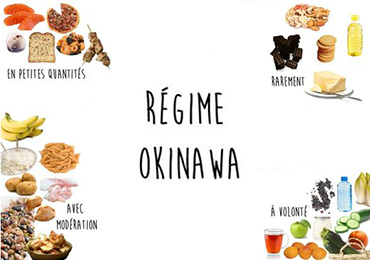We often talk about how to take care of our mind and consciousness, improve stress and emotional management. So it seemed important to me to share with you this article from nutrition.fr to take care of your physical body and your life.
In 2013, the world's oldest man and woman (116 and 115 years old) were Japanese. The inhabitants of Japan and the Okinawa archipelago off the coast of Japan enjoy an exceptional life expectancy. Dr. Curtay reviews the 11 pillars of the lifestyle of Okinawa's supercentennial generation, which is based on a diet rich in vegetables, gluten-free and dairy-free.
The Okinawan way of life is :
1. A low calorie consumption (about 300 calories less than in our regions) of a very wide variety of foods (206 different foods listed), eaten with art and pleasure.
2. 78% of what is consumed is vegetal origin.
3. The consumption of soybean and derived products is the highest in the world (leading to a very significant amount of phytoestrogens).
4. The Rice (gluten-free) takes the place of bread and other cereals.
5. In 22% animal food, a lot of fish, some meat, almost no dairy products.
6. Intakes of antioxidants (tea, vegetables, fruit, soya, spices...), omega 3 fatty acids (rapeseed oil, fish, soya...) and magnesium (soya and even more tofu, beans, sesame seeds, green vegetables, sweet potatoes...), the three most important types of nutrients in the fight against ageing, inflammation and the majority of diseases, are exceptionally high.
7. Physical activity remains abundant and regular at all ages.
8. Multiple stress management and self-treatment tools are used on a daily basis, particularly from shiatsu (toxic tools such as tobacco, excess alcohol or calories, « narcotics » such as TV hypnosis are not used).
9. An appreciation of the inestimable value of the existence of the universe, of all its material and cultural riches, of life, the awareness of a connection beyond oneself to nature and ancestors, a sense of belonging, of rooting oneself in the "great All" are cultivated every day, nurturing the desire and the pleasure of « lasting ».
10. A "tough-cool" character (Gujuh taygay in Okinawa dialect): both positive (positive vision of the world, of existence, of oneself, of one's choices, of one's health...), autonomous, solid, centered, nourished by convictions followed with a rigorous coherence, dominant, sometimes authoritarian, listening to reality (often curious about everything) and to one's own needs, authentic, resilient (ability to bounce back), generous, non-conformist, feeling invested with a "mission" (at least that of cultivating health and good living, of being as happy as possible, and often that of contributing, of transmitting). They are almost all very active (there are many creative people among the centenarians) and otherwise peaceful from day to day, calm, patient, disciplined, flexible, able to recognize their mistakes, to put things into perspective, to « dampen emotions » (as Prof. Vellas put it), in a good mood, living moments of true joy, loving playful approaches and, quite often, laughing and facetious.
11. Elders still have a place, both during their lifetime and after their death. They are considered, celebrated as good luck charms, and objects of the attention of their family, their neighbours, all traditionally united. After his death, an ancestor remains in his house on a small altar and is visited several times a year. Death, which is not feared, is not synonymous with disappearance or annihilation ; the conviction of having lived well, of having been useful, the connection to the "great All", to the ancestors, to the family, to the descendants, all contribute to this feeling.


